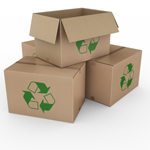
Principles of Sustainability
Chapter 3 - The Culture of Waste
Part 3 - Reduce Reuse Recycle
 Reducing, reusing, and recycling our waste has a positive impact on our waste generation, our waste management, and ultimately, our world. Our culture of waste will change if our attitudes and behaviors change to accelerate a new approach to the waste metabolism of our own human society. Solid waste heading to landfills, open dumps, and incinerators, is growing in complexity and quantity. It can be minimized with effective planning of community waste management support systems — like recycling centers — and more importantly, by our own personal actions. Remarkable examples such as Germany, demonstrate the community mobilization and technical feasibility for very high rates of waste reduction through recycling and composting.
Reducing, reusing, and recycling our waste has a positive impact on our waste generation, our waste management, and ultimately, our world. Our culture of waste will change if our attitudes and behaviors change to accelerate a new approach to the waste metabolism of our own human society. Solid waste heading to landfills, open dumps, and incinerators, is growing in complexity and quantity. It can be minimized with effective planning of community waste management support systems — like recycling centers — and more importantly, by our own personal actions. Remarkable examples such as Germany, demonstrate the community mobilization and technical feasibility for very high rates of waste reduction through recycling and composting.
As landfills grow to capacity, especially in highly built and densely populated areas, we will be faced with limited options — all of them expensive — to effectively manage our waste while ensuring public health and environmental quality. A transition in the way we relate to the products we consume and the waste we create will save resources and create profits in resource reuse. We have choices, and our choices will create the landscape that we leave behind.
Keywords
- waste reduction
- waste prevention
- source reduction
- waste reuse
- recycling
- Integrated Solid Waste Management Hierarchy
- landfill
- incineration
- mass burning
- compost
- anaerobic digestion
- aerobic digestion
- discards
- biogas
Suggested Reading
-
US Environmental Protection Agency. Advancing Sustainable Materials Management: Facts and Figures Report . 2020.
-
US Environmental Protection Agency Office of Solid Waste. Solid Waste Management Hierarchy.
- European Commission Directorate-General for the Environment. Waste. 2021.
(Photo credit: Peek Packaging Solutions, 2006)
